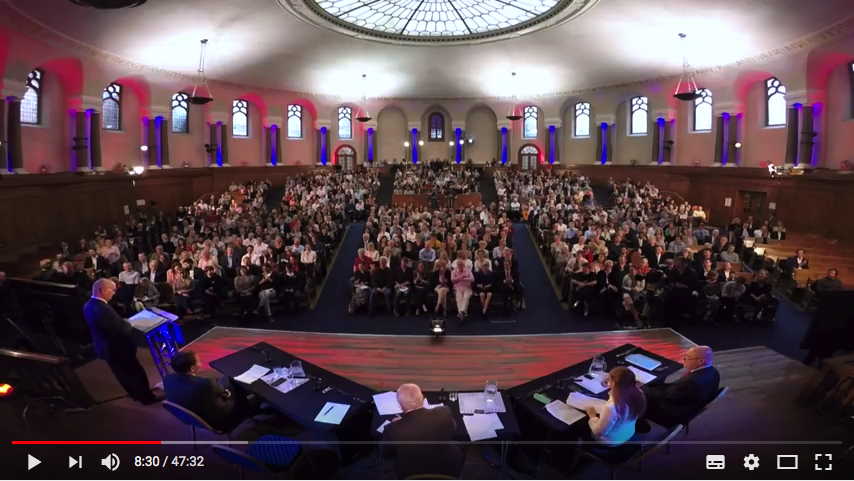|
| |
| |
| |
|
| 1) |
le jeudi 29 juin 2017
|
Catégorie : Russie |
Type : Conférence-Débat |
 It’s time to bring Russia in from the cold: Rapprochement is in the West's best interests.
It’s time to bring Russia in from the cold: Rapprochement is in the West's best interests.

It’s time to bring Russia in from the cold: Rapprochement is in the West's best interests. |
Nik Gowing | The Intelligence2 dabate
Discussion, Interaction, Persuasive argument ? The Intelligence2 dabate
Isn’t it time we took a more intelligent approach to Russia? You don’t have to be a fan of Vladimir Putin or support his invasion of Ukraine and annexation of Crimea to see that an accommodation with Russia might be a good thing. Many would argue that it’s the West that is to blame for the bad blood between Russia and the West in the first place. Ever since the Wall came down, NATO has been expanding eastwards without any regard for Russia’s security interests. Russia’s actions may appear aggressive and expansionist to us, but in Moscow they are seen as a defensive strategy. Surely it is in everyone’s best interests if we understand that. As for the recent US airstrikes on Syria, Trump may have wanted to look tough on the world stage, but the conciliatory line he took towards Russia during his campaign was far more constructive. It’s easy to paint President Putin as the bad guy here, propping up the murderous Assad, but his main aim is to end the civil war in Syria and defeat ISIS. Does the West have anything better to offer?
That’s the case for improving relations with Russia. But should we come to an accommodation with a foreign power which threatens our Eastern European partners and goes so far as to meddle in last year’s US presidential election? The problem is not that the West has been too expansionist towards Russia, but that it hasn’t stood up to Putin’s aggressions. After failing to act over Ukraine and Crimea, the West is now confronted by an emboldened Russia which is helping Assad wreak destruction against captive Syrian civilians, and trying to destabilise Europe at this volatile moment by cultivating populists such as Marine Le Pen and extremist groups sympathetic to its interests. Russia is an unpredictable, dangerous power and should be kept at arm’s length.
For this major debate, Intelligence Squared put together a stellar line-up. Making the case for rapprochement with Russia were Vladimir Pozner, one of Russia’s best known television journalists and a former advocate for the Soviet Union, and Domitilla Sagramoso, a leading expert on security in Russia; arguing against them were Michael Hayden, former director of both the CIA and the NSA, and Radek Sikorski, who was Poland’s foreign minister from 2007 to 2014.
Ajoutée le 29 juin 2017 par iqsquared
6 575 vues au 29/10/2017 | durée 47:32'
|
|
| 2) |
le jeudi 29 juin 2017
|
Catégorie : Actualités, Géopolitique |
Type : Interview |
|
| 3) |
du jeudi 29 juin 2017 au lundi 31 juillet 2017
|
Catégorie : Histoire |
Type : Littérature |
PU Paris-Sorbonne, rue Danton 8, F-75006 Paris
 Russes et Français (1812-1818). Une histoire des perceptions mutuelles.
Russes et Français (1812-1818). Une histoire des perceptions mutuelles.
. Une histoire des perceptions mutuelles. 2017-06-29.jpg)
Russes et Français (1812-1818). Une histoire des perceptions mutuelles. |
de Maya Goubina
« Moscou est une des plus belles et des plus riches villes du monde, cette ville sainte, centre de l’Empire » - ces belles appréciations sont tirées non pas du carnet d’un voyageur bienveillant, mais de l’un des outils principaux de la redoutable propagande napoléonienne – le Bulletin de la Grand Arme. La question identitaire étant le sujet de ce livre, Maya Goubina limite volontairement la base de ses sources aux documents strictement contemporains des événements étudiés afin de saisir le fonctionnement des stéréotypes. Les documents privés (correspondances, journaux intimes) lui permettent d’illustrer le bouillonnement de la pensée des Français et des Russes qui avaient été amenés de confronter leurs représentations avec les réalités de vraies personnes et de vrais lieux. Elle analyse également des documents officiels, ce qui lui offre une perspective intéressante pour étudier les composants quelques peu enfouis et parfois inattendus de ses représentations. La guerre amène les milliers de Français en Russie en 1812 et les Russes leur rendent la visite deux ans plus tard et ceci, pour rester durant 3 années sur le sol français. Ce moment fort dans l’histoire des rencontres franco-russes pourrait l’évolution des perceptions mutuelles des deux nations, même si ses conséquences s’imprimeront directement dans la pensée des contemporains, alors que d’autres « découvertes » seront vite oubliées.
Poche
Editeur : PU Paris-Sorbonne (29 juin 2017)
Collection : Imago mundi
Langue : Français
ISBN-10: 2840509482 | ISBN-13: 978-2840509486
|
|
Calendrier /
Affiches du mois
|
Livre d'or →
consultation /
signature
|
Enquête →
besoins des contacts
|
Bordereau →
notice (réservé)
|
inscription |
Liens →
agenda similaires | livres-souvenirs
| |